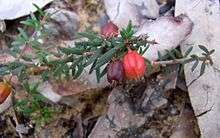Micrantheum ericoides
| Micrantheum ericoides | |
|---|---|
 | |
| Ku-ring-gai Chase National Park, Australia | |
| Scientific classification | |
| Kingdom: | Plantae |
| (unranked): | Angiosperms |
| (unranked): | Eudicots |
| (unranked): | Rosids |
| Order: | Malpighiales |
| Family: | Picrodendraceae |
| Tribe: | Caletieae |
| Subtribe: | Pseudanthinae |
| Genus: | Micrantheum |
| Species: | M. ericoides |
| Binomial name | |
| Micrantheum ericoides Desf. | |
Micrantheum ericoides is an inconspicuous shrub growing on poor sandy soils in eastern Australia. Often seen in areas of mid to relatively high rainfall. Usually seen between 20 and 80 cm high. Flowers are tiny, white or pink occurring between August and November. However, the plant may be noticed by the red fruit capsules.
The specific epithet ericoides refers to a similarity to the European heath, or Erica.[1] This plant first appeared in scientific literature in 1818, published by the French botanist René Louiche Desfontaines.
References
- ↑ Les Robinson - Field Guide to the Native Plants of Sydney, ISBN 978-0-7318-1211-0 page 166
This article is issued from Wikipedia - version of the Thursday, May 10, 2012. The text is available under the Creative Commons Attribution/Share Alike but additional terms may apply for the media files.